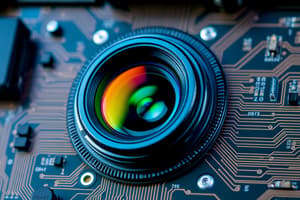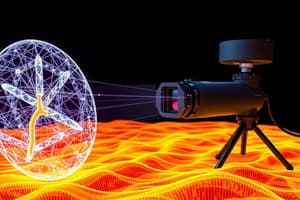Podcast
Questions and Answers
Why is calibration considered crucial in sensor technology?
Why is calibration considered crucial in sensor technology?
Ensuring accurate and reliable measurements
What drives advancements in sensor technology according to the text?
What drives advancements in sensor technology according to the text?
Need for precise and reliable measurements in various fields
What is the purpose of regular calibration in sensor technology?
What is the purpose of regular calibration in sensor technology?
Maintain accuracy and performance over time
How do temperature sensors typically work?
How do temperature sensors typically work?
What interaction do most sensors rely on for measuring physical quantities?
What interaction do most sensors rely on for measuring physical quantities?
Explain the working principle of a chemical sensor.
Explain the working principle of a chemical sensor.
How do pressure sensors operate?
How do pressure sensors operate?
Provide examples of common types of sensors.
Provide examples of common types of sensors.
What are some applications of sensors in the healthcare industry?
What are some applications of sensors in the healthcare industry?
How do sensors contribute to environmental monitoring?
How do sensors contribute to environmental monitoring?
Flashcards are hidden until you start studying
Study Notes
Advancements in Sensor Technology
Sensor technology has undergone significant advancements in recent years, leading to the development of more sophisticated and efficient sensors. These advancements are driven by the need for precise and reliable measurements in various fields such as healthcare, transportation, industry, and environmental monitoring. The focus on miniaturization, energy efficiency, and improved data accuracy has led to the creation of smaller, more powerful sensors that can be integrated into a wide range of applications.
Sensor Calibration
Calibration is a crucial aspect of sensor technology, ensuring that the measurements are accurate and reliable. Calibration procedures involve adjusting the sensor's parameters to match the desired output for a given input. The calibration process can be performed using various methods, such as direct comparison with reference standards, indirect methods using mathematical models, or software-based calibration techniques. Regular calibration is essential to maintain the sensor's accuracy and performance over time.
Working Principles of Sensors
The working principles of sensors vary depending on the type of sensor. However, most sensors rely on the interaction between the sensor and the physical quantity being measured. For example, temperature sensors work by sensing the change in resistance or voltage as the temperature varies. Chemical sensors use chemical reactions to detect the presence of specific substances, while pressure sensors work by measuring the deformation of a material due to changes in pressure.
Types of Sensors
There are numerous types of sensors, each designed to measure specific physical quantities. Some common types include temperature sensors, pressure sensors, humidity sensors, light sensors, and motion sensors. These sensors can be categorized based on their working principles, measurement range, accuracy, and response time.
Sensor Applications
Sensors have a wide range of applications across various industries. In healthcare, sensors are used to monitor patient vital signs, track medication adherence, and monitor environmental factors that affect health. In transportation, sensors are used to monitor vehicle performance, detect collisions, and provide real-time traffic information. In industry, sensors are used for process control, quality assurance, and predictive maintenance. In environmental monitoring, sensors are used to monitor air quality, water pollution, and soil quality.
In conclusion, sensors play a vital role in our daily lives, providing accurate and reliable measurements for various applications. The rapid advancements in sensor technology have led to the development of more sophisticated and efficient sensors, which are continuously improving our understanding of the world around us.
Studying That Suits You
Use AI to generate personalized quizzes and flashcards to suit your learning preferences.




